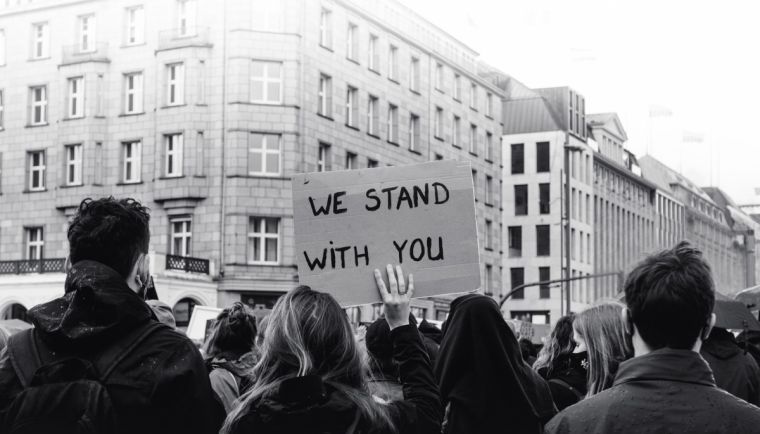A crackdown on peaceful protest is a crackdown on religious freedom

If you open a newspaper or turn on the TV now, it's likely any mention of protest will quickly be linked to the Insulate Britain protests around the M25.
This may well prompt mixed feelings. On the one hand, relief that people are making the case for saving the planet. On the other hand, frustration with the forced delays and disruption to people's lives.
At the same time, though, there is something far more troubling going on that the headlines have all too often missed. The Government is attempting to crack down on the right of ordinary people to stand up to wrongdoing by those in power through their controversial Policing Bill.
Why? This would make little difference to those for whom the prospect of arrest is not a disincentive. What it will do though is cause ordinary people to be intimidated by police if they join with others to stand up to those in power.
Fundamentally, the Government wants to give police powers to punish anyone participating in a protest that those in charge deem to be potentially too 'noisy', 'annoying' or causing 'unease', even if people don't realise that conditions have been imposed.
Christians would do well to beware. Protest after all is part of how we have come to be who we are. Judaism – from which Christianity grew – has been described by the former Chief Rabbi Jonathan Sacks as 'a living protest against a world of hatred, violence and war'. One billion of the world's Christians who could be described as Protestant, are so-called because of the protest of their forebears.
And of course, we all share the story of Jesus' triumphal entry into Jerusalem, on a donkey as a contrast to the pageantry of the rulers of the city. As the procession progressed people shouted 'hosanna', meaning 'save us' or 'liberate us'. Certainly, it was noisy, very possibly annoying, and clearly caused unease for the Roman occupiers. They would not have been granted 'permission' from the authorities. It probably even obstructed the road for a time.
Returning to modern times, the historian Diarmaid McCulloch argues that throughout Anglicanism's centuries of involvement with social change, its role in the liberation struggle in South Africa should give it most pride. But according to a recent study by academics, had the proposed Policing Bill been in place, many of the actions of that movement would have been threatened.
People of faith have already been speaking out – a recent 350-organisation letter raising concerns about the changes was signed by Anglican, Catholic, Methodist, Quaker and Unitarian groups, alongside Buddhists, Jews, Muslims and many more. In the House of Lords, the Bishop of Manchester opposed the Bill.
So far though, the Bill has been voted through the House of Commons, with amendments now being considered in the House of the Lords. As they do so they will no doubt survey public opinion, which on one hand shows a clear level of concern about the Government's direction of travel on human rights, but also hesitates to support the kinds of protests which have most recently grabbed headlines.
Protest might cause mixed feelings. But as Christians, we know that speaking up for justice is central to so many people's faith. We know that taking to the streets in protest is about standing in the conviction of our faith, about calling out injustice and demanding that decision-makers act for the common good.
A crackdown on peaceful protests would, in effect, be a crackdown on religious freedom. We must speak out and urge Parliament to reverse this dangerous direction for our rights.
Tim Gee is a faith-based activist and Christian Aid supporter.











